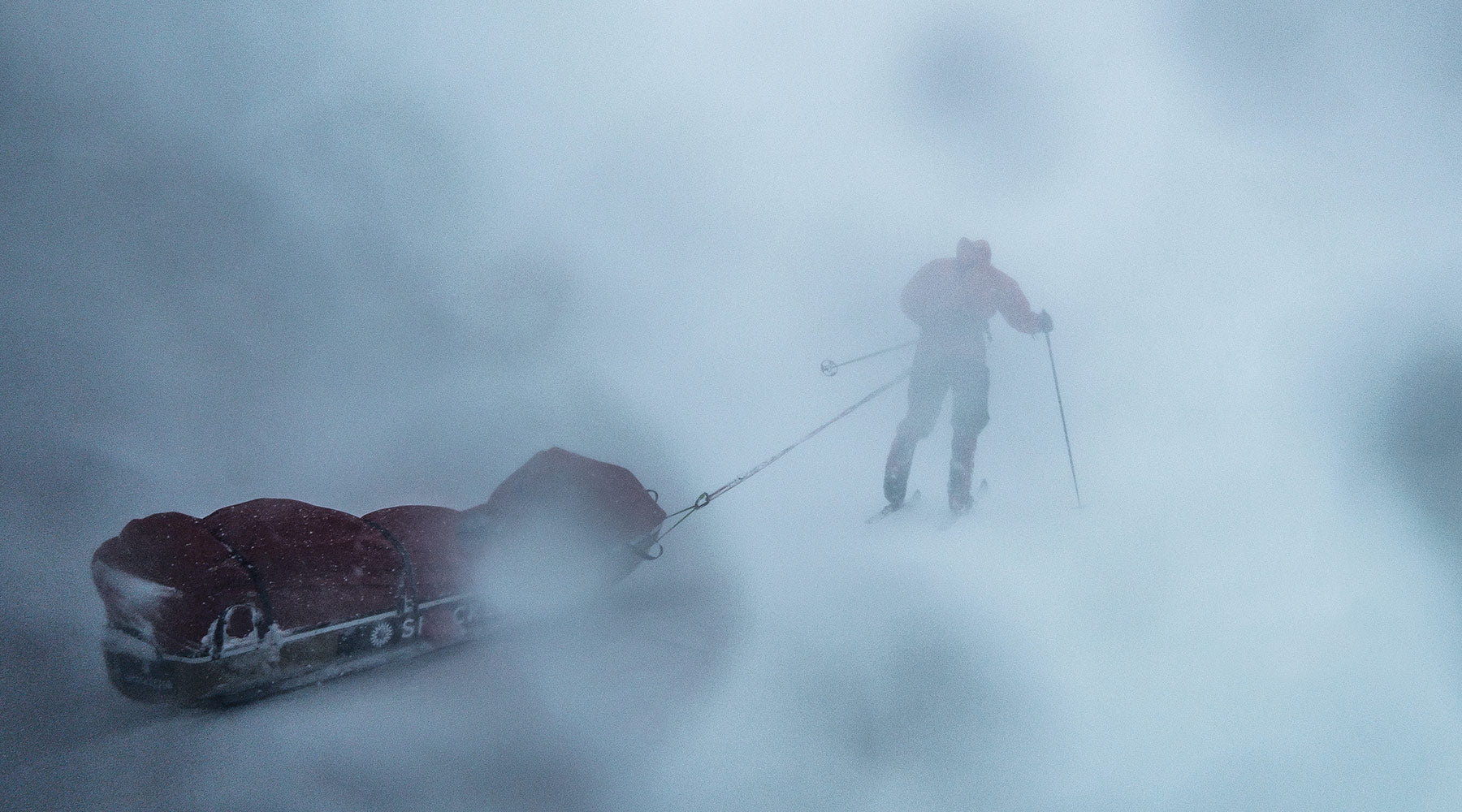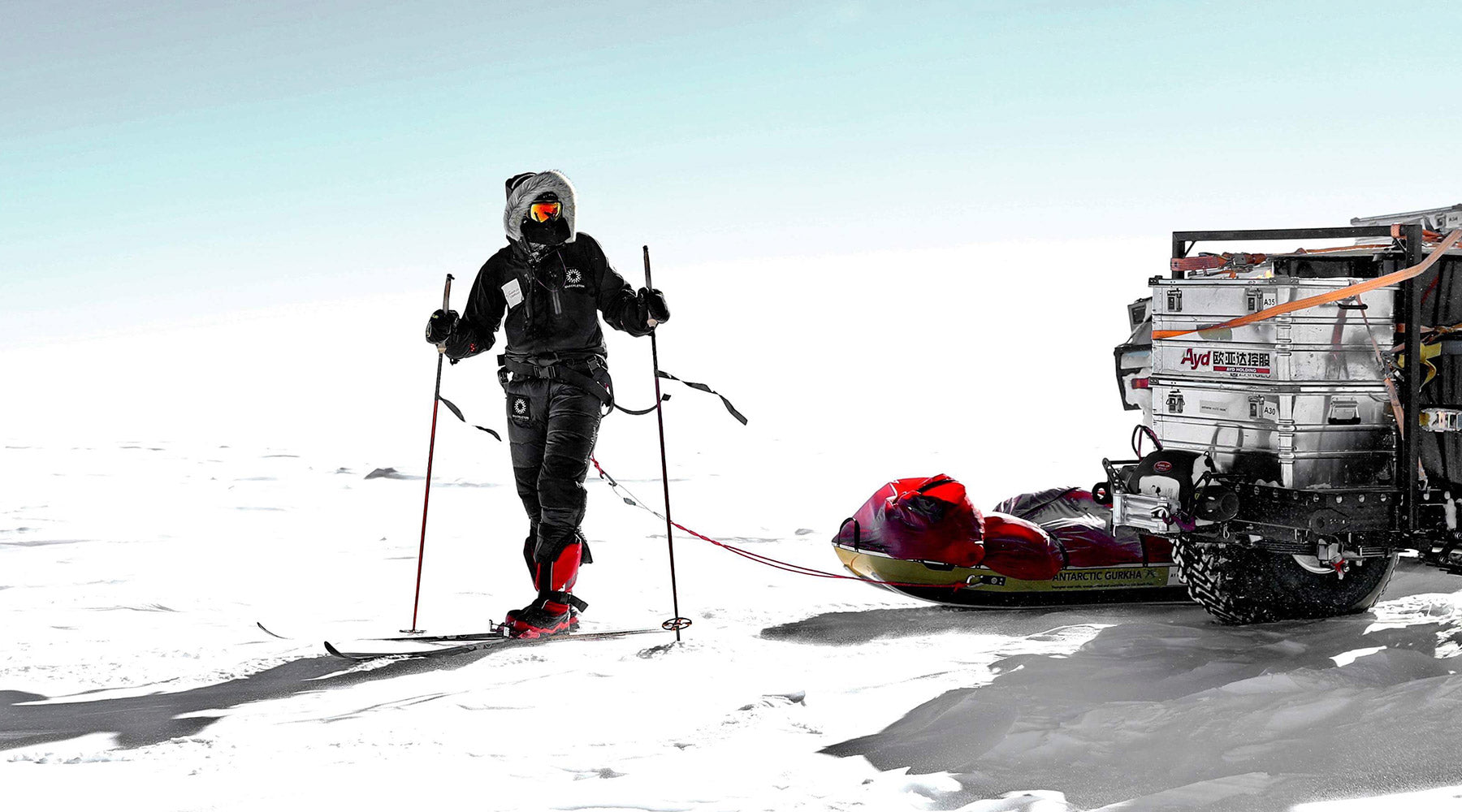
Louis Rudd solo traverses Antarctica
Shackleton sponsors Louis Rudd as he becomes the first Briton to traverse Antarctica solo and unsupported, affirming his place as one of the most decorated polar explorers of the modern era.
At 5pm in Antarctica, on 31 December, the ALE Twin Otter descended into view and landed on the Ross Ice Shelf. Two figures were waiting on the ice; their skinny bodies taut with muscle, faces sunburnt, features nipped by frost and lips cracked with dried blood. Together they had played chase across the world’s driest and most inhospitable continent, from the Messner Start via the South Pole through the Transantarctic Mountains to the Ross Ice Shelf.
One was Lou Rudd, a 49-year-old British Army Captain; the other was American Colin O’Brady, a 33-year-old endurance athlete with three world records to his name. Both men set out on a mission to become the first to ever traverse Antarctica solo, unsupported and unassisted, a gruelling journey of 925 miles.
Each day the toll of their solitude and daily exertion rose. Their routines varied slightly, but they were united by a strict regime of calorie loading and hard mileage. Both men relied heavily on warm fluids and stodgy snacks as they heaved their 300lb Norwegian sleds across the ice, sometimes spending as long as 12 hours in the harness.
As the expedition continued O’Brady and Rudd adopted different approaches. It was the same slow motion of sliding one foot in front of the other, although their rhythms gradually grew more distinct day by day. O’Brady broke his day down into eight 90-minute stretches; Rudd, nine stints of 70 minutes. All the while Rudd grazed with a bag of chocolate, nuts, fruit pastilles, salami and frozen cheese, which he tucked into his cheek like a hamster.
For company Rudd took to listening to 80s music and sinking into audiobooks, like the biography of Winston Churchill.

Before stopping to set up camp at the end of each day, Rudd would take an extra 11 steps, a habit he adopted during past expeditions owing to a calculation that posited the survival of Scott and his party if they’d taken another 11 steps each day on the Terra Nova Expedition.
Ultimately, both Rudd and O'Brady succeeded in traversing Antarctica, with the American finishing ahead of the Brit by two days. They had spent weeks and weeks being hammered by the elements, blinded by whiteouts, whipped by spin-drifts and buckled by sastrugi.
We've compiled a selection of extracts from Lou's journal that give an insight into what he was enduring on a daily basis:
Tough Battle | Nov 4, 2018 (Day 2)
“It got really tough with the pulk. The sheer weight in the pulk and trying to move this thing. I found that today – light sastrugi all day, and the pulk was catching all the time and bringing me to a halt. I’d have to jerk forward with my hips and try and unblock it and then get the thing moving again and it was a constant battle really all day with me trying to get the pulk moving and making progress.
“It’s really dawning on me how tough a challenge I’ve undertaken here. I briefly saw the American Colin O’Brady this morning. He was camped about an hour behind me when I woke up this morning so a bit of a speck in the distance, and after about an hour – he looked like he was up and moving and following in my track (obviously we’re both heading the same way) – but after a couple of hours I couldn’t see him anymore so I’m not sure how he’s getting on. I’m sure he’s having as difficult a time as I am trying to move this pulk.”
The Bird | Dec 2, 2018 (Day 30)
“Definitely the highlight of the day. It was around about two o’clock and I was having a hard time, I was moving quite slowly, feeling a bit fatigued and done in. I caught something moving out of the corner of my eye and I looked up. It was a bird in front of me. Pure white. A stunning bird about the size of a dove, with a little black beak, literally fluttering right in front of me… I’m not a particularly spiritual person, but if ever there was anyone coming to pay me a visit and have a look, that was it. It really made my day and I spent the rest of the afternoon thinking about it. It was just such an amazing moment. I really enjoyed that. If it was someone, I know exactly who it was.”
Parhelion | Dec 3, 2018 (Day 31)
“When I popped outside. There was an awesome parhelion around the sun – which was absolutely stunning. Sometimes it’s called a sun dog as well; it’s basically like a giant rainbow – a sort of big halo around the sun – and it’s created by frozen ice crystals in the air that create the phenomenon. It’s absolutely stunning. Quite nice to have that for the start of the day. That was around for a couple of hours as I was skiing.”
Reflection | Dec 11, 2018 (Day 39)
“Full whiteout right from the beginning. Really strong winds that were bringing up a lot of spindrift. And also actual snowfall as well making the hauling really difficult. I accepted right from the beginning it was going to be a tough, challenging day. I put my head down. I was on the compass. It was complete full whiteout; saw absolutely nothing all day. So it was 11 hours of staring at the compass. I used the time, I got into a rhythm, to kind of reflect on my performance so far on the expedition and was feeling quite self-critical…”

“By this point on SPEAR we’d had several [rests] by now, every couple of weeks... I haven’t taken a single one now in 39 days. I think actually – oh I’m a couple of years older too – in a few months’ time I’ll be 50 years old. I kind of came away, after reflecting on that today, feeling quite positive about my performance so far on this expedition. I think I am doing as much as I possibly can. I’ve still got over 300 nautical miles to go, so I don’t want to go crazy and push way too hard. So I felt quite positive by the end of the day, having analysed my performance against previous trips. I’m reasonably happy with that. I’m now two days away from the Pole.”
The Trudge | Dec 12, 2018 (Day 40)
“The sun came out and I was able to make better progress. Where I’d been slow in the day, I was really keen to get as close to Pole as I could by the end of the day so I ended up extending the day quite a bit just to get myself in position. I’m pleased to say I’m now camped 11 miles from the South Pole, which is absolutely fantastic. It was a long, hard day to get to this point, but I’ve positioned myself deliberately now so I can certainly reach the South Pole tomorrow. Which is really exciting – sort of like Christmas. It’s a huge milestone, and the third time that I’ve skied full range from coastline into the South Pole. I’m really looking forward to that, it’ll be amazing.”
The South Pole | Dec 13, 2018 (Day 41)
“I set my alarm for 4am this morning. I knew it was going to be a big day. I was on the move just after 5. Absolutely atrocious conditions unfortunately, total whiteout, driving snow, almost like a blizzard, which was a shame, with 11 miles to do to get into Pole. So I ploughed on, and literally I saw nothing, until about a mile and a half out, conditions were that bad. Constantly scanning the horizon through the mist trying to look for something and, finally, in the gloom, and outline of a radar instillation, which is on the outskirts of the Pole. Incredible feeling to finally see something, and realise I was getting there. From there, you have to aim for the final way point, which is a sign, a big sign that ALE have positioned. It says ‘congratulations, you’re almost at the South Pole…’”

For The Final Time… Onwards | Dec 27, 2018 (Day 55)
“My number one priority was to come out here and ski solo, unsupported and unassisted right across the continent and by the end of tomorrow, I’ll have done that. That was always the primary objective. I’ve always been keen to avoid the media… [They’re] really keen to make it a race issue, the fact that the American Colin was out here at the same time – I’ve done my upmost to completely avoid that. I didn’t want to… the minute you get drawn into a race scenario, everything you’re doing is dictated by the other person. You’re having to react. It changes the whole nature of the expedition. You put yourself under a lot of pressure and I decided right from the early stages I wasn’t going to get drawn into that, and I was just going to do my expedition, and not let anything else interfere with that. I’m really pleased that that’s what I’ve done. I haven’t been reacting. I’ve just come and done my journey.
“To be honest it’s a minor miracle that both of us have completed a journey that’s been attempted before, nobody’s ever managed it, and then, lo and behold, in one season two of us attempting it. A lot of expeditions have come out here – it’s been a really difficult season for expeditions, with the conditions. The fact that both of us have finished is absolutely fantastic. I’m really pleased for both of us. Where I’ve come – it’s just a title thing. It doesn’t mean anything to me, first, second. It’s just a title. What matters is that I’ve completed my expedition, and that’s the bit that’s really important to me.”

